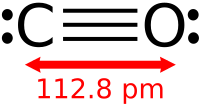
Photo from wikipedia
Abstract With coal chars, CBK/G is a reaction mechanism that accurately predicts gasification histories across the commercial domain of temperature, pressure, gas composition, size, and coal quality, given data to… Click to show full abstract
Abstract With coal chars, CBK/G is a reaction mechanism that accurately predicts gasification histories across the commercial domain of temperature, pressure, gas composition, size, and coal quality, given data to tune-in a single kinetic parameter for each char sample. This study develops a CBK/G parameter estimation protocol for biochars from diverse biomass forms. Kinetic parameters are specified to accurately match gasification histories for 17 biochars from 700 to 1000 °C at steam and CO2 pressures to 0.1 MPa. With biochars, calibration data must specify both a frequency factor and activation energy for the desorption of a surface carbon oxide. Half the biochars in the database required different activation energies than the 180 kJ/mol baseline value, which spread the assigned energies from 130 to 220 kJ/mol. Woods in raw, torrefied, and pelleted forms tend to have the fastest reactivities, along with a few biochars of agricultural residues (AgRes). The biochars of grasses and AgRes have reactivities only one-third of woods’, although the reactivities of diverse AgRes biochars spans a very broad range. Steam gasification is faster than CO2 gasification, but the differences in rates are much smaller than with coal chars. The cross relations in CBK/G that relate channels for steam and CO2 gasification remain to be validated with tests under both steam and CO2 and their mixtures for diverse biochars.
Journal Title: Fuel
Year Published: 2021
Link to full text (if available)
Share on Social Media: Sign Up to like & get
recommendations!